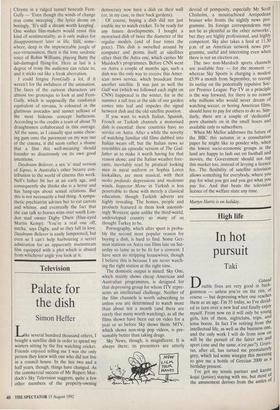Television
Palate for the dish
Simon Heffer
Lle several hundred thousand others, I bought a satellite dish in order to spend my winters sitting by the fire watching cricket. Friends enjoyed telling me I was the only person they knew with one who did not live in a council house. In the last two and a half years, though, things have changed. As the commercial success of Mr Rupert Mur- doch's Sky Television suggests, quite a few other members of the property-owning
democracy now have a dish on their wall (or, in my case, in their back gardens).
Of course, buying a dish did not just enable me to watch cricket. To be ready for any future developments, I bought a motorised dish of twice the diameter of the regular models (and of four times the price). This dish is swivelled around by computer and points itself at satellites other than the Astra one, which carries Mr Murdoch's programmes. Before CNN went on Astra a couple of months ago, such a dish was the only way to receive this Amer- ican news service, which broadcast from another satellite. It was just as well the Gulf war (which we followed each night on CNN) happened in the winter, for in the summer a tall tree at the side of our garden comes into leaf and impedes the signal between dish and the old satellite position.
If you want to watch Italian, Spanish, French or Turkish channels a motorised dish is essential: these countries have no service on Astra. After a while the novelty of watching familiar old films dubbed into Italian wears off, but the Italian news so resembles an episodic version of The God- father as to make it worth having for that reason alone; and the Italian weather fore- casts, inevitably read by piratical looking men in naval uniform or Sophia Loren lookalikes, are most musical, with their molt° profundo depressions and moderato winds. Inspector Morse in Turkish is less penetrable to those with merely a classical education, though Turkish adverts are highly revealing. The homes, people and products featured in them look astonish- ingly Western; quite unlike the third-world, undeveloped country so many of us thought Turkey to be.
Pornography, which after sport is proba- bly the second most popular reason for buying a dish, is hard to find. Some Ger- man stations on Astra run films late on Sat- urday so tame as to be fit for a convent. I have seen no stripping housewives, though I believe this is because I am never watch- ing the right station at the right time.
The domestic output is mixed. Sky One, which mainly shows cheap American and Australian programmes, is designed for that depressing group for whom ITV repre- sents an intellectual challenge. Neither of the film channels is worth subscribing to unless you are determined to watch more than about ten a month (and there are rarely that many worth watching), as all the films shown have been out on video for a year or so before Sky shows them. MTV, which shows non-stop pop videos, is pre- sumably better than taking drugs.
Sky News, though, is magnificent. It is always there; its presenters are utterly devoid of pomposity, especially Mr Scott Chisholm, a moustachioed Antipodean bruiser who fronts the nightly news pro- gramme. Its foreign correspondents may not be as plentiful as the other networks', but they are highly professional, and highly competent. Sky also takes a feed at 11.30 p.m. of an American network news pro- gramme, useful and interesting even when there is not an election on.
The two non-Murdoch sports channels are available free — for the moment — whereas Sky Sports is charging a modest £5.99 a month from September, to recoup its outlay on the potentially repulsive Soc- cer Premier League. Pay-TV as a principle is the way forward, for there is no reason why millions who would never dream of watching soccer, or boring American films, should have to pay for others to do so. Sim- ilarly, there are a couple of 'dedicated' porn channels on in the small hours and available only to subscribers. When Mr Mellor addresses the future of the BBC this autumn in a consultation paper he might like to ponder why, when the lowest socio-economic groups in the land are happy to lash out on football and movies, the Government should not tap this market too, instead of levying a licence fee. The flexibility of satellite television allows something for everybody, where you pay for what you get and you get what you pay for. And that beats the television licence of the welfare state any time.
Marlyn Harris is on holiday.


















































 Previous page
Previous page